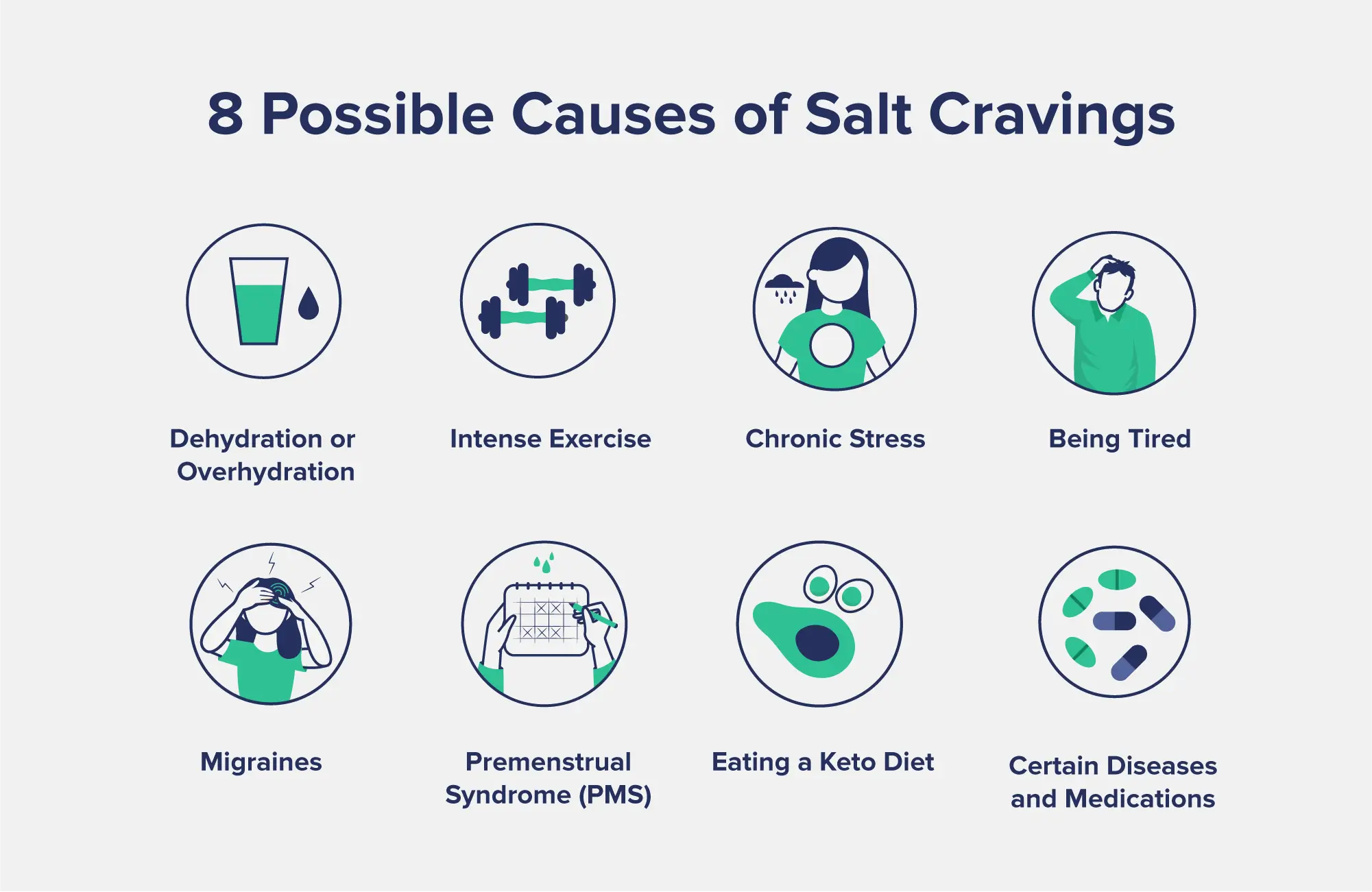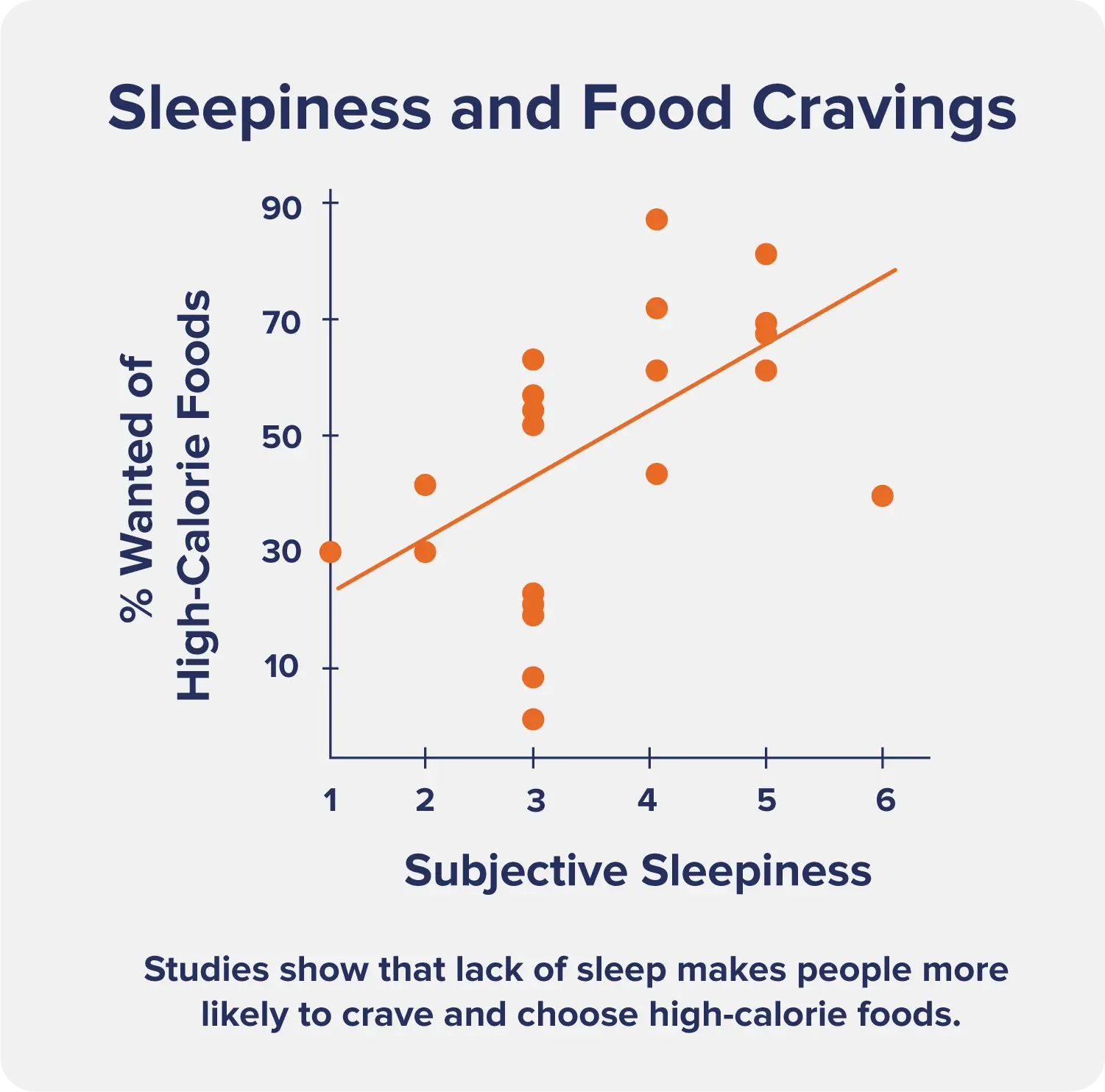Try our favorite, clean protein powder: See our top pick →
Try our favorite, clean protein powder: See our top pick →
This post contains links through which we may earn a small commission should you make a purchase from a brand. This in no way affects our ability to objectively critique the products and brands we review.
Evidence Based Research To fulfill our commitment to bringing our audience accurate and insightful content, our expert writers and medical reviewers rely on carefully curated research.
Read Our Editorial Policy
We’ve all had a craving for potato chips, pretzels, or French fries at one point or another—but what does it mean when you’re constantly craving salty foods?
From a historical perspective, our long-ago ancestors lived in a salt-scarce environment, causing salt cravings to become a part of our biological programming.
Now, we have unlimited access to salty foods, and our bodies have developed tightly related systems used to control sodium balance—however, sometimes things can get dysregulated, leading to salt cravings for a multitude of reasons.
From dehydration and chronic stress to migraines and keto dieting, let’s dive into the top eight most common causes of craving salt.
There are many varying reasons why you might be craving salt. If you’re constantly and chronically having salt cravings, be sure to talk with your doctor to rule out any underlying health conditions.

Sodium is a vital mineral and electrolyte found in your body’s fluids that helps to control how much water goes in and out of cells (among many other things).
Although it sounds counterintuitive, both dehydration and overhydration can lead to craving salty foods.
Craving salty foods is a symptom telling you that your body’s electrolyte balance is no longer where it should be, which can be due to dehydration or overhydration.
If you have recently sweated a lot, have not been drinking enough fluids, or have lost fluids from an illness, your body will likely lack water and sodium, causing salty cravings.
If you are severely dehydrated and only drink plain water but not any sodium (or electrolytes), you can develop hypotonic dehydration, causing a higher sodium concentration inside cells and lower electrolyte levels in the fluid outside cells.
On the flip side, overhydration can also cause a salt craving because you’ve diluted your blood sodium, causing those levels to drop and triggering your body to attempt to regain homeostasis (balance).
What To Do About It:
If you’re overhydrated from drinking tons of plain water, you should consume electrolytes to help rebalance your optimal sodium-to-water level.
If you are dehydrated due to a lack of both fluids and salt, try replenishing with water anda pinch of sea salt or electrolyte powder.
Along the same lines, intense exercise with excessive sweating can cause you to crave salt because you have lost electrolytes through perspiration.
If you ran a 10K or went on a long hike, you may notice that you actually see crystallized salt on your body or clothes—this is a surefire sign that you have lost sodium through sweating.
What To Do About It:
Add an electrolyte powder to your water or consume a salty snack after intense exercise where you sweated excessively. While Gatorade and other sports drinks are commonly used in this situation, we prefer electrolyte drinks that are lower in sugar, like these ones.
Perhaps surprisingly, being chronically stressed can cause salt cravings.
Although researchers aren’t entirely sure what causes this, some speculate that eating salt stimulates your hypothalamus to release dopamine, a “pleasure” neurotransmitter.
Some animal studies have shown that restricting sodium causes anxiety, while replenishing salt intake reduces anxiety and stress, suggesting that we may seek out salt when stressed to soothe our moods.
Others think that craving salt occurs because stress increases cortisol levels, which promotes food cravings—and people tend to go for chips and crackers rather than blueberries and Brussels sprouts when they’re jonesing for a snack.
What To Do About It: Although easier said than done, mitigating chronic stress is important for many areas of health. Try to reduce chronic stress by exercising, eating a well-balanced diet, going to therapy, or taking supplements for stress or mood balancing.
Not getting enough sleep—especially night after night—is known to weaken your resolve to eat healthy.
Studies show that people who undersleep are more likely to eat high-salt, high-fat, and high-sugar foods than those who are well-rested.
Poor sleep can also raise cortisol levels, causing similar consequences as being chronically stressed.

What To Do About It:
Aim for 7 to 9 hours of high-quality sleep each night. Some tips include not eating or drinking alcohol close to bedtime, limiting screen time and blue light exposure at night, and keeping your bedroom dark, cool, and quiet.
People who suffer from migraines may experience salt cravings (or have a sweet tooth).
This is because salty or sweet foods may help temporarily alleviate some of the pain associated with the migraine.
Migraine headaches may also occur as a withdrawal symptom after excessive sodium chloride (salt) intake, which can be from binge eating or overconsumption of highly processed foods.
Research suggests that eating a lower-sodium diet can alleviate migraine headache symptoms.
In a study of 390 people with migraines, those who ate the lowest amount of daily sodium (1500mg) had a 31% reduced occurrence of migraine headaches compared to those who ate the most sodium (3200mg).
What To Do About It:
Talk to your doctor about migraine headaches and try not to eat too much salt to reduce the risk of salt-induced withdrawal migraines.
The week leading up to a woman’s menstrual period can be rife with physical, hormonal, and emotional changes, including different food cravings or preferences.
Craving salt can occur in the premenstrual phase because hormone levels (especially estrogen and progesterone) fluctuate significantly. When estrogen levels drop, the body’s fluid and electrolyte balances can become askew, triggering salty food cravings.
PMS can also increase cortisol levels or disrupt sleep, which we know can increase salt cravings.
Plus, salty foods may provide a temporary boost in serotonin or dopamine levels, which can provide a sense of comfort during emotionally turbulent times.
What To Do About It:
Ensure your hydration and electrolyte statuses are well-balanced (drinking enough water and electrolytes), and aim for a week where you can relax and partake in comforting, low-stress activities.
People who eat low-carb or keto diets tend to experience lots of health benefits—but they may also notice that cravings for salty foods are increased.
When people first start eating keto, they tend to eliminate ultra-processed foods, which are major sources of salt.
Keto also means that you won’t be eating high-carb foods, causing the body to almost immediately lose water weight (the “hydrate” in carbohydrates means that there is water attached to it).
This can lead to dehydration or imbalances in electrolytes, in addition to lower insulin levels causing increased sodium excretion through the kidneys.
What To Do About It:
Ensure adequate consumption of electrolyte-rich fluids, and don’t be afraid to salt your food at home (if you’re not eating any processed foods).
Lastly, many diseases and medications can cause salt cravings.
Some disorders associated with craving salt include:
There are also many medications that may disrupt your adrenal glands or cause sodium loss, including certain pain medications, glucocorticoids, antifungals, and immune checkpoint inhibitors—talk to your doctor if you experience cravings on any medication.
What To Do About It:
Talk to your doctor!
The only deficiency that could cause salt cravings is a deficiency in sodium or chloride (which is rare). If you undereat salt (sodium chloride), you could experience salt cravings.
Craving salt could come from a number of things, ranging from dehydration and low levels of electrolytes lost in sweat to stress and poor sleep. You may also crave salty foods if you have a certain health condition (like Addison’s disease), experience migraines, if you have premenstrual syndrome (PMS), or have started eating a keto diet.
First, be sure that you are well-hydrated with fluids that contain electrolytes. Some of our favorite electrolyte drinks include Liquid IV and Trace Minerals (learn more here).
A true salt deficiency is called hyponatremia—when blood sodium levels drop below the normal range (135-145 mEq/L). In these severe situations, you could experience nausea, vomiting, cramps, confusion, seizures, and dizziness.
The Dietary Guidelines for Americans recommend that sodium intake for adults should be 2,300 milligrams of salt per day or less. If you have hypertension (high blood pressure), the recommended intake level drops to 1,500 milligrams per day.
However, the World Health Organization (WHO) recommends consuming less than 2,000 milligrams of daily sodium.
Keep in mind that most dietary sodium is found in packaged, ultra-processed, and fast food or restaurant meals—not from the salt shaker that you use while cooking.
Subscribe now and never miss anything about the topics important to you and your health.